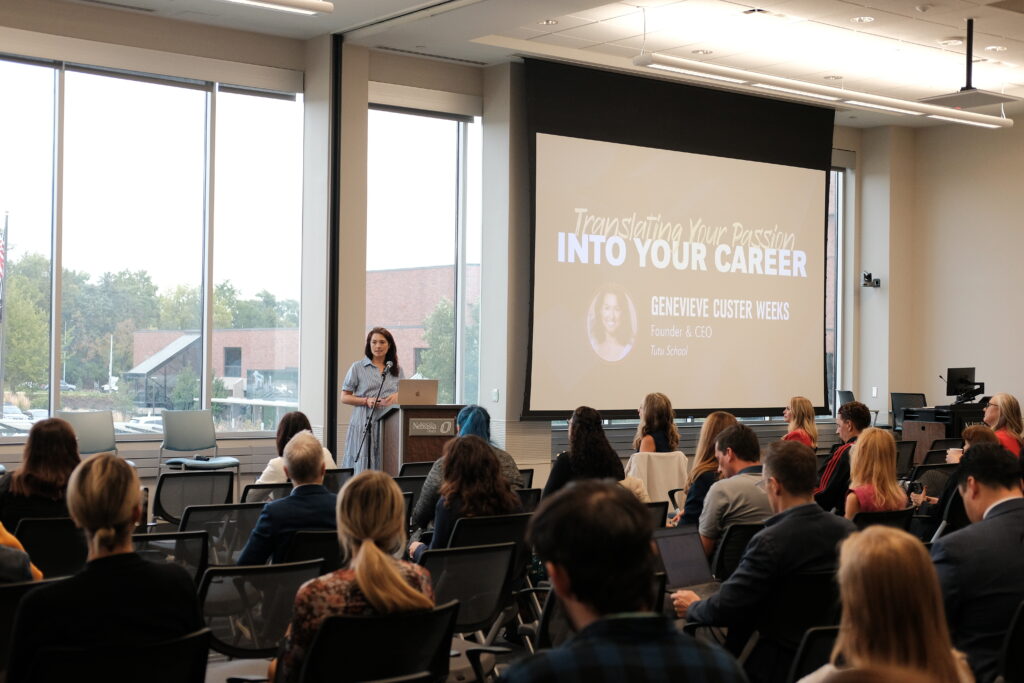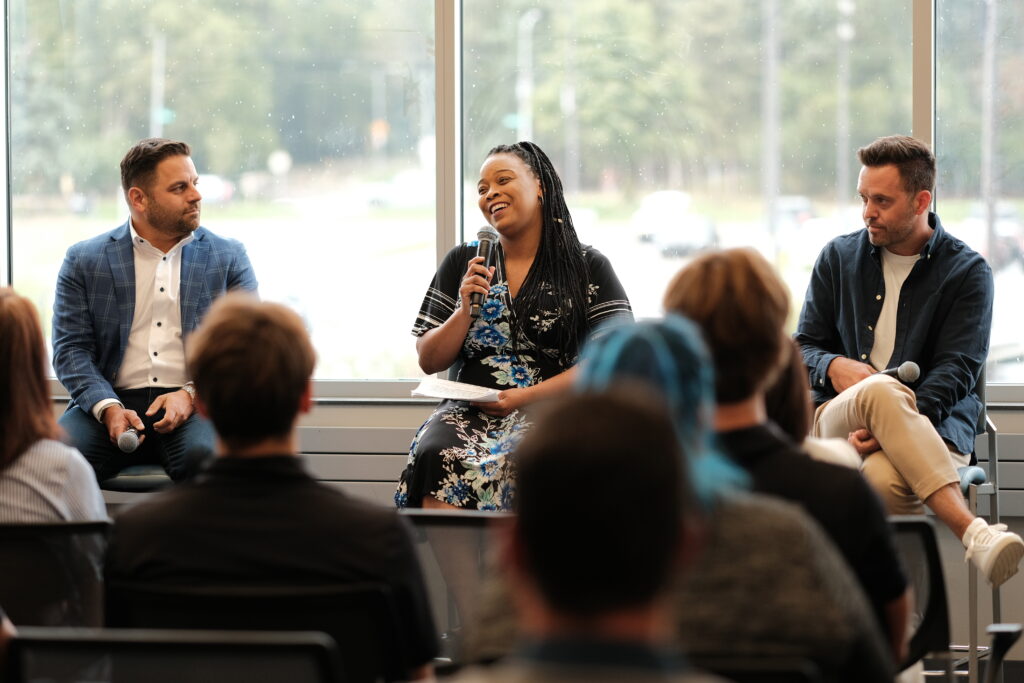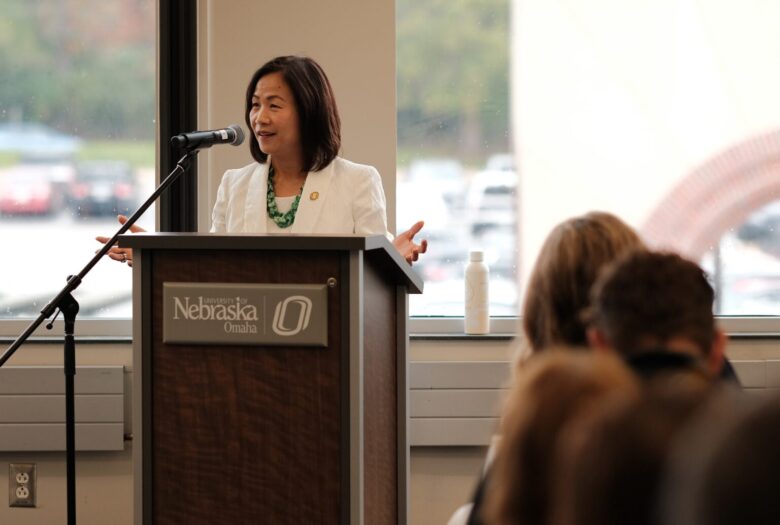The big takeaway from this year’s Future of Work Symposium at the University of Nebraska at Omaha: There’s no straight path to being entrepreneurial. “Not everyone wants to be, or should be, an entrepreneur,” said keynote speaker Genevieve Custer Weeks. “But anyone can be entrepreneurial in their work and in their career.”
The symposium, held on Sept. 17, focused on “The work revolution: Redesigning careers with an entrepreneurial approach.” To UNO Chancellor Joanne Li, that approach is also important to the university itself. She urged faculty, staff and students to be more entrepreneurial, especially given the instability faced by the University of Nebraska system.
“This is the perfect time, when higher ed is being beaten down so badly, you will — no, must — do this,” Li said. “I want to remind all of us: Circumstances create opportunity, difficulty and challenges create entrepreneurs.”
Custer Weeks knows that from experience. She originally intended to be a professional ballet dancer, but faced medical setbacks and rejections. During that time, Custer Weeks told a full conference room, she was developing the fundamentals of entrepreneurship. She sorted them into five buckets: knowing your ‘why,’ being creative, practicing discipline, cultivating resilience and acting boldly.
“Unbeknownst to me at the time, I practiced all of these things in my first career as a professional ballet dancer, although the last thing I would have described myself as at the time was an entrepreneur,” Custer Weeks said.
Opportunity came when Custer Weeks was working as a dance teacher for young kids. Parents were looking for a milestone — their child’s first dance — but most dance schools weren’t catering to that experience. Nor were they doing intentional programming for child development, let alone having an easy sign-up method or clear communication with families.
Custer Weeks thought she could do better with her own school. So she found a space in San Francisco and, in February 2008, opened Tutu School, offering ballet classes to young children. The school quickly grew, and Custer Weeks opened a second one.

But “the reality of having two different leases and two different teams to manage, and payrolls also, set in,” she said. “I really started realizing there was no way I personally could ever open up all the Tutu Schools that there could be, certainly not my own.”
A friend had franchised a business, so Custer Weeks decided she could, too. Now, Tutu School has just under 140 locations across the country. And instead of running one or two spaces and teaching kids, Custer Weeks is CEO.
In doing so, she’s continuing to embrace entrepreneurship, especially internally, by empowering staff to pursue new ideas. She encouraged symposium attendees to find ways to be entrepreneurial no matter their work environment, and to be willing to act.
“A Tutu team member of ours, who’s now in a key operations role, came to us as an assistant and proposed the idea of a ballet book club,” Custer Weeks recalled. “It wasn’t in her job description. It was nowhere near it, but she knew that events and layers of programming were such an important part (of Tutu School).”
Local entrepreneurs reflect on journeys, share mindset tips
A symposium panel continued the theme of looking at entrepreneurship as a winding road. Emiliano Lerda, the CEO of Elevator, remembered his time leading the Center for Immigrant and Refugee Advancement.
“I learned to respect processes and systems,” he said. “I learned a lot of really valuable lessons … but there was a point in time in which I felt like I had hit my ceiling there, and I really wanted to step outside of my comfort zone, and I was seeking growth opportunities.”
Eventually, that led to the creation of Elevator. But first, it took a slog of rejections by bank and finance partners that weren’t interested in the vision of Elevator. That experience taught Lerda the perhaps under-appreciated entrepreneurship skill of discernment.
“I always thought persistence is important,” he said. “But discerning when to be persistent is (more) important. What’s important is to also be passionate, but also discerning how to be and when to be passionate.”

April Hibbler, executive program lead at the Nebraska Opportunity Exchange, remembers getting angry in some work environments. Maybe a solution to a problem was obvious, but not being implemented. Family members encouraged her to take action, rather than being frustrated.
Taking that opportunity builds confidence, and for some, it can make them feel like a changemaker. But not every place is receptive to change. “You’re not gonna always get this buy-in, that’s just the reality of the world,” Hibbler said. That’s why it’s important to think bigger, and not just solve problems, but tell the world about it on social media.
“Show it: I’m doing this, they weren’t doing this, and I just solved that problem,” Hibbler said. “So other people are gonna start to see you. You’re branding yourself.”
For Rick Knudtson, co-founder of Workshop (and before that, Flywheel), entrepreneurship has always been about solving problems that might not seem obvious to everyone. An essential part of that is inspiring customers and startup employees to care about the problem.
“I would think about, yes, the problem is correct, but who needs to understand why it’s valuable?” he said. “How do I get them inspired to allow us to actually tackle that problem? And you can do that inside any company.”
In response to a question about how to get students at UNO to be more entrepreneurial, panelists zeroed in on the skillsets students should develop.
“Be prepared to wear a lot of hats,” said Alan Tipp, MTRLobjects co-founder. “It’s daunting at times. Get some sort of business classes under your belt, or find an area … that’s a passion for you. If you like marketing, then take marketing courses, or design, because it’s going to be valuable.”
For Hibbler, doing so is an essential backstop to any career — and its unexpected changes. “You have to get those skills so you can have that as an option in your life,” she said. “At some point, (entrepreneurship) may be the reality that you’re almost, sometimes, forced into.”
Lev Gringauz is a Report for America corps member who writes about corporate innovation and workforce development for Silicon Prairie News.

